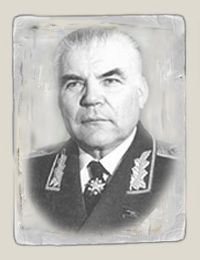Rodion Malinovsky
 23. 11. 1898 - 31. 3. 1967 23. 11. 1898 - 31. 3. 1967Rodion Malinovsky commanded the 2nd Ukrainian and Trans-Baikal Fronts; Marshal of the Soviet Union, the USSR Minister of Defence. Malinovsky was born in Odessa on November 11 (23), 1898. A lady-cook’s base son. After graduating from a parochial school, Rodion Malinovsky left his home in 1911. In 1911-1913 he worked as a farm servant. In 1913-1914 he was In 1914 he volunteered for the front and was assigned to a machine-gun brigade of the 256th Elisavetgradsky infantry regiment. In October of 1914 he was wounded and awarded the 4th Class George Cross. In February of 1916 he was sent to France in the Russian expeditionary corps. He was again wounded there and received the French War Cross. Was sent to a quarry like many Russian soldiers disarmed in France after the October Revolution of 1917. Malinovsky decided to join the Foreign Legion of the French Army where he fought until the Germany was surrended. After returning home, he voluntarily joined the Red Army (1919). As the infantry regiment’s instructor (the 240th riffle regiment) he fought against Kolchak’s army and the whites in Siberia. During the Civil War he rose from platoon commander to battalion leader. In 1926 R. Malinovsky joined the All-Union Communist Party of Bolsheviks. In 1930 he graduated from the Frunze Military Academy. In 1937-1938 he was involved in the fighting in Spain on the side of the Republican government, and was awarded the Order of the Red Banner. During the mass repressions in 1937-1938 among the commanders there was enough material against Malinovsky as a member of the military-fascist conspiracy, but the cause was not set in motion. Since 1939, he taught at the Military Academy named after M. Frunze. When the Great Patriotic War started General-Major Malinovsky commanded the 48th infantry corps on the USSR border. In august 1941 he was appointed commander of the 6th army and fought heavily. In 1941-1942 he commanded the South and the North-Caucasus Fronts. In 1942 he distinguished himself in the Battle of Stalingrad. The Army of Malinovsky, in cooperation with other armies halted, and then defeated the Army Group “Don” of. Field Marshal E. von Manstein, who tried to relieve encircled at Stalingrad grouping of Paulus. Since 1943 Rodion Malinovsky commanded the troops of the South and South-West Fronts, released Nikolaev and Odessa. Together with the forces of General Tolbukhin, General Malinovsky defeated the southern wing of the enemy’s front encircling 22 German divisions and the 3rd Romanian Army in the Iasi-Kishinev operation. Marshal Malinovsky liberated Romania, Hungary, Austria and Czechoslovakia. In 1944 Rodion Malinovsky was promoted to the rank of Marshal of the Soviet Union. From July 1945 Malinovsky commanded the Trans-Baikal Front, which caused the brunt to the Japanese Kwantung Army in Manchuria. The troops released North-Eastern China and Liaotung Peninsula. By the Decree of the Presidium of the Soviet Union dated September 8, 1945 Marshal Malinovsky was awarded the honorary title of Hero of the Soviet Union, the Order of Lenin and the Gold Star medal (# 9041). After the war up to 1956 R. Malinovsky served as Chief of the Forces in the Far East, then in 1956-1957 he commanded of Land Forces – was First Deputy Minister of Defence. Since October 1957, Marshal Malinovsky was Minister of Defence of the USSR. By the Decree of the Presidium of the Supreme Soviet on November 22, 1958 Minister of Defense, Marshal of the Soviet Union, Rodion Malinovsky was awarded a second Gold Star medal (# 49). He actively participated in a “palace coup” when Nikita Khrushchev was ousted from his post of the 1st Secretary of the CPSU Central Committee and replaced by Leonid Brezhnev. After that he had a huge stroke with the nation. Marshal Malinovsky elected a CPSU Central Committee’s member, deputy of the Supreme Soviet both of the USSR and the RSFSR. The Marshal wrote: “Soldiers of Russia”, “Wrathful vortices of Spain”; “Budapest - Vienna – Prague”, “Finale”, etc. He died on March 31, 1967. Was buried on Red Square near the Kremlin Wall, Moscow. Marshal R.Ya. Malinovsky was awarded: two Gold Stars of Hero of the Soviet Union, five Orders of Lenin, The Order “Victory”, three Orders of the Red Banner, two 1st Class Orders of Suvorov, the 1st Class Order of Kutuzov, a number of medals. He had 24 foreign awards (including 15 foreign Orders). In 1964 he was awarded the title of the People’s Hero of Yugoslavia. A bronze bust of twice Hero of the Soviet Union R. Malinovsky was set in Odessa. Streets in Moscow, Kiev and Kharkov are named after him. In 1967-1998 Military Academy of Armored Forces was named after him. In 1998 the Academy along with Frunze Military Academy and military courses “The Shot” joined the Military Academy of the Armed Forces of the Russian Federation. |




